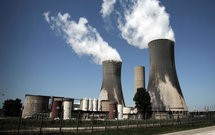 In the two years since the earthquake and tsunami that resulted in core reactor meltdowns at Japan’s Fukushima Daiichi power plant, public opinion has turned against nuclear power. By May 2012, Japan was without nuclear power for the first time since the 1970s. Only two nuclear reactors have since been restarted. This has forced Japan to increase imports of energy sources like natural gas to meet energy demands. As Japanese Prime Minister Shinzo Abe seeks to revive the Japanese economy amid pressure to permanently discontinue nuclear power in Japan, he faces the same geographic isolation and resource scarcity that challenged previous Japanese leaders.
In the two years since the earthquake and tsunami that resulted in core reactor meltdowns at Japan’s Fukushima Daiichi power plant, public opinion has turned against nuclear power. By May 2012, Japan was without nuclear power for the first time since the 1970s. Only two nuclear reactors have since been restarted. This has forced Japan to increase imports of energy sources like natural gas to meet energy demands. As Japanese Prime Minister Shinzo Abe seeks to revive the Japanese economy amid pressure to permanently discontinue nuclear power in Japan, he faces the same geographic isolation and resource scarcity that challenged previous Japanese leaders.
Japan is an island nation that lacks any substantial domestic reserves of traditional energy sources, including oil and natural gas. The demand for energy has forced Japan to orient externally in order to grow and sustain the economy. Historically, this external focus and the securing of resources have been accomplished both militarily and through trade. In the first half of the 20th century, Japan relied on its naval power to maintain open sea lanes for imports of raw commodities to power its industrial base. Japan’s entrance into World War II was, at its core, a response to the U.S. threat to this precept. Japan had to secure access to energy, oil and coal, in this case. When the United States threatened this imperative, Japan pre-emptively reacted by striking Pearl Harbor.
This inherent need to secure resources takes the issue of Japanese nuclear power beyond domestic politics. After the global oil crisis of the 1970s, Japan pursued an energy policy that focused on conservation and efficient use of oil products. While total energy consumption rose considerably, oil consumption remained essentially stagnant during this time, despite the growth of the Japanese economy. Increased consumption of nuclear power over the same period, in part, allowed for this shift. Before the earthquake in 2011, plans to further increase nuclear power potential remained a prominent part of Japan's energy policy. In addition, to maintain trade, the island nation must maintain open sea lanes, and Japan continues to face ongoing disputes over sovereignty of islands and maritime borders. These disputed waters could provide a new, domestic source of energy. But these waters must be protected regardless of whether they hold such resources; in a worst-case scenario, another nation (such as China), could infringe on Japan’s key sea lanes.
Public opinion in Japan has turned against nuclear power. Citing the dangers of having nuclear plants in an area so prone to earthquakes, protesters are calling for an end to nuclear power in Japan. But the number of protesters remains relatively small compared to the total Japanese population. Additionally, public opinion does not always agree with national interests. Since World War II, Japan relied on its alliance with the United States to secure its access to raw materials. As long as its relationship with Washington does not sour, Tokyo has the room to maneuver away -- albeit on a limited basis -- from nuclear power toward imported fossil fuels without undermining its energy security. Although energy availability is unlikely to be threatened, it remains to be seen how long Japan will endure the high costs of additional imports of natural gas and oil.
Abe seeks to reinvigorate the Japanese economy. But promoting economic growth and private investment while energy costs remain high will be difficult. Additionally, Japanese utility TEPCO said on March 11 that it would be difficult to remain profitable for the next fiscal year, and would require either restarting its largest nuclear plant or raising prices. Although some projections predict that a handful of nuclear reactors will restart this year, popular opinion remains against nuclear power. However, popular opinion would also likely be against increased living costs and a lagging economy.
In the end, the decision to refocus nuclear power in Japan becomes a cost-benefit analysis. Nuclear power allowed Japan to become less reliant on oil imports after the shock of the 1970s oil crisis. Despite large up front capital costs that might deter other nations, nuclear power remains the cheapest option for Japan. It also decreases Japan's vulnerability to international natural gas markets. Japan currently pays a premium for imports of liquified natural gas.
Historically, Japan has responded to a series of external shocks to its energy security, sometimes through military action, other times through changes in domestic behavior. Given the strict set of geographic constraints that Japan faces as a nation, and its desire to restart the economy, Japan's options remain limited. Two possible responses include restarting nuclear power plants, despite public opinion, or further normalization of the military to gain more access to surrounding waters, which may possess new or unconventional resources. Access to a domestic source of energy reserves would fundamentally loosen Japan's geopolitical constraints.
Courtesy : Stratfor (www.stratfor.com)